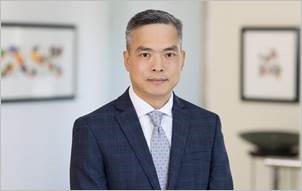
Gang Chen is the newest partners at Crowell & Moring in Chicago. He focuses on patent litigation and prosecution for corporate clients, but also does everything in between, including patent licensing and general IP counseling for corporate clients.
Gang earned a Ph.D. in Physics, and wrote his thesis on solid-state quantum optical devices for quantum computing. “For me, that physics background serves as a foundation for my ability to quickly understand technical aspects of the matters I handle. A physics and electrical engineering background can be broad in that it allowed me to move around in an industrial lab and learn about many adjacent scientific and technological areas before becoming a lawyer. That’s also very helpful for handling legal issues involving technologies – software, hardware, mechanical, electric, etc.”
Despite Gang’s unique specialization in training, he values the soft skills he learned that have allowed him to handle legal issues across a wide range of technical subject matters including semiconductors, wireless/wireline communications, video/audio processing, artificial intelligence, and more. On some occasions, Gang has put his special physics training to direct use in handling patent projects relating to quantum computing/information and advanced optical technologies for a number of research-focused University clients.
Gang’s path towards becoming a partner at a major law firm was far from traditional. Gang grew up in Sezhuan province of China and, following a one-year military service, he earned his undergraduate physics degree at Beijing University. At the time, the best option for continuing his physics research was graduate school in the United States. Gang pursued his Ph.D. in Physics at the University of Michigan, earning a Master’s degree in Electric Engineering along the way. From there, Gang took his talents in solid-state and optical physics to Bell Labs of Lucent Technologies (which became Alcatel-Lucent, and then part of Nokia) for several years. Gang became interested in IP work and pivoted into working with the legal team at Bell Labs as a patent technology manager. This is where Gang found his true calling in intellectual property law, which he followed by enrolling in Seton Hall University School of Law, and completing his Ph.D. at night, while simultaneously working in-house.
Gang feels fortunate that he stumbled upon law after a research-heavy career. “I’m happy to see that all those years of technical training were not wasted. I get to utilize every bit of my past experience. I wish more people who are pursuing technical education could know about intellectual property law or other areas of law that are tied to technologies as a career option early on.” To that end, Gang hopes to see IPLAC and its members continuing to reach out beyond law schools to technical communities. “I often run across graduate students who are broadly interested in anything technology, but who are deterred by having to go along a single research direction for a long time. For those folks, a legal career dealing with broad and flexible technology issues would make a wonderful fit.”
Before becoming a lawyer, Gang was a prolific researcher and engineer with over 100 publications in leading journals and conference proceedings. Gang is also a holder of over a dozen U.S. and international patents.
